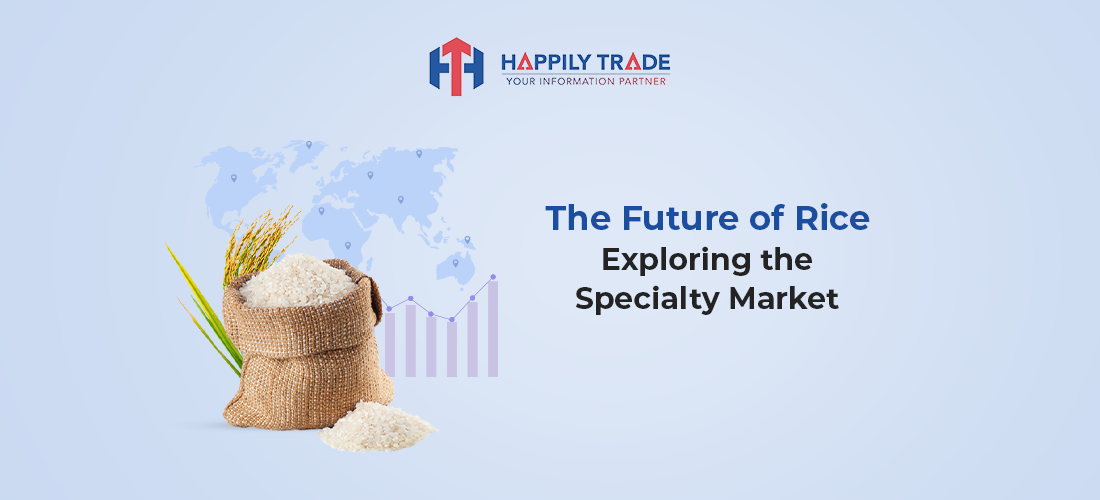Specialty Rice: Catering to Diverse Tastes & Premiums in the Global Market
- Log in to post comments
The global rice market is a vast and dynamic landscape. While staple varieties like long-grain white rice remain dominant, there's a growing appreciation for specialty rice. This niche market offers unique flavors, textures, and cooking properties, attracting a discerning clientele willing to pay a premium. Companies can leverage import export data providers to gain valuable insights into the specialty rice market.
Understanding the Specialty Rice Market
The specialty rice market is experiencing significant growth. Consumers increasingly seek aromatic rice like basmati and jasmine, which are known for their fragrant notes and fluffy texture. Glutinous rice, essential for Southeast Asian cuisine, is another popular choice. Additionally, pigmented varieties like black and red rice are gaining traction due to their perceived health benefits and visual appeal.
Key Drivers of the Specialty Rice Trend
Several factors contribute to the rise of specialty rice:
Globalization and Ethnic Cuisine
Exposure to diverse cuisines worldwide has fueled a demand for authentic ingredients. Specialty rice varieties play a crucial role in replicating these dishes.
Health Consciousness
Consumers are becoming more aware of the health benefits associated with certain specialty rice types. Black rice, for instance, boasts higher levels of antioxidants than white rice.
Premiumization
Specialty rice is often positioned as a premium product, appealing to consumers seeking gourmet experiences. The unique characteristics and usually limited availability elevate its perceived value.
Types of Specialty Rice
The world of specialty rice is vast and exciting. Let's explore some popular varieties:
Aromatic Rices:
Basmati Rice: This long-grain rice hails from India and Pakistan and is renowned for its delicate, nutty aroma and fluffy texture. Basmati is ideal for pairing with curries and other flavorful dishes.
Jasmine Rice: Another long-grain variety, jasmine rice originates in Southeast Asia. It possesses a subtle floral fragrance and slightly sticky texture, perfect for various Asian dishes.
Glutinous Rice: Also known as sticky rice, this short-grain variety has a high starch content, resulting in a sticky and slightly translucent cooked texture. Glutinous rice is central to Southeast Asian cuisine and is used in dishes like dumplings and rice cakes.
Pigmented Rice:
Black Rice: This unique rice variety boasts a deep black color due to anthocyanin pigments. Black rice offers a slightly nutty flavor and a chewy texture, often used for its visual appeal and perceived health benefits.
Red Rice: This reddish-brown rice gets its color from an antioxidant called anthocyanin. Red rice has a slightly nutty flavor and a firmer texture than white rice.
Challenges and Considerations
While the specialty rice market presents a promising opportunity, there are challenges to consider:
Higher Cost
Specialty rice often carries a premium price tag compared to regular white rice. This can limit accessibility for some consumers.
Sustainability Concerns
The production of certain specialty rice varieties can be more water-intensive compared to traditional rice.
Availability:
Specialty rice may only be readily available in some regions, requiring consumers to source it from specialty stores or online retailers.
The Future of Specialty Rice
Despite these challenges, the future of specialty rice appears bright. As consumers continue seeking unique flavors and healthy food options, specialty rice is poised for further growth. Technological cultivation and processing advancements can address sustainability concerns and improve availability. Additionally, with a growing focus on food traceability and origin stories, specialty rice producers can leverage unique varietals and regional characteristics to differentiate their offerings further.
Leveraging Import Export Data for Success in Specialty Rice
To navigate this dynamic market effectively, import export businesses can leverage valuable insights from custom import export data providers. Here's how this data can empower your business decisions:
Market Research and Trend Analysis
Gain comprehensive data on import and export volumes of various specialty rice varieties across different regions. This allows you to identify emerging trends and tailor your offerings to meet evolving consumer preferences, ensuring you capitalize on the most promising opportunities.
Sourcing and Customer Acquisition
Partner with a data provider with expertise in the specialty rice market. Their data can connect you with reliable suppliers for specific rice varieties based on trade flow analysis. Additionally, you can identify potential customers in regions with a growing demand for the specialty rice you intend to import or export.
Competitive Intelligence
Track import and export activities of your competitors to understand their sourcing strategies, target markets, and pricing structures. This knowledge allows you to differentiate your offerings, develop a competitive edge, and secure exclusive partnerships with sought-after suppliers or distributors.
Informed Market Entry Strategies
If you're planning to enter a new market with a particular specialty rice, import/export data can provide crucial insights into import regulations, tariffs, and potential logistical challenges. This empowers you to develop a well-informed market entry strategy that minimizes risks and maximizes your chances of success.
Price Negotiation and Risk Management
Analyze historical import/export data and current market trends to make informed decisions regarding pricing for your specialty rice. This data can also help you identify potential disruptions in the supply chain or fluctuations in demand, allowing you to manage risks and maintain profitability proactively.
Navigate the Specialty Rice Market with Confidence: Partner with Happily Trade Exim

As a leading global import export company specializing in trade data, Happily Trade Exim can be your one-stop shop for navigating the complexities of the specialty rice market. We understand the importance of having access to reliable and insightful data to make informed business decisions.
Our team of experts leverages cutting-edge technology to provide you with a comprehensive suite of custom import export data solutions. Through our platform, you'll gain access to global import and export data on over 80 countries and hundreds of ports, allowing you to track trade flows for various specialty rice varieties.
We offer a user-friendly interface with customizable dashboards, pivot tables, and exportable data in Excel format, empowering you to analyze trends and identify lucrative opportunities within the specialty rice market.
Partner with Happily Trade Exim and gain the data-driven insights you need to thrive in this exciting and dynamic niche.








